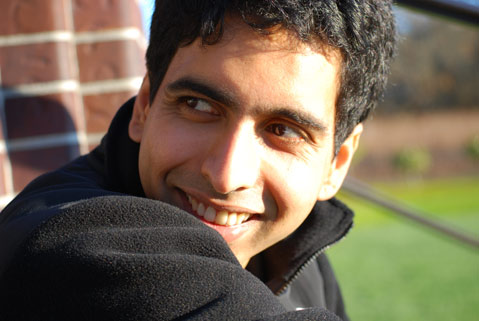Salman Khan’s All-Access Academy
Online Educator Lynda Weinman Chats with Founder of Khan Academy

The second installment of our occasional series of interviews between Lynda.com founder Lynda Weinman and some of the speakers that UCSB Arts & Lectures is bringing to town features Salman Khan, the founder of Khan Academy. (See the first interview with TOMS Shoes founder Blake Mycoskie here.) Like Lynda.com, the Khan Academy offers educational opportunities online, but unlike Lynda.com and other fee-based services, it offers those classes — currently tallying more than 3,000 YouTube videos on topics from math and science to finance and civics — absolutely free.
“I encourage anyone who cares about the future of education to see Salman Khan speak,” said Weinman. “His story, his company, and his vision for a better education methodology are potently inspirational, and provide proof of the positive impact technology can have in today’s ever-increasing standardized school system.” She also recommends checking out his TED talk here.
He comes to UCSB’s Campbell Hall for a talk on October 10 at 8 p.m. Here’s a transcript of their email interview.
Before you recorded your first video, did you ever have any teaching or acting experience? It seems to come so naturally to you, but was there a progression and do you think you’ve improved with practice?
No acting experience. I’m flattered that you would feel that way. I guess the closest answer is that we have a very expressive family. But I like to talk — maybe that’s obvious, someone who does 3,010 videos likes to talk! But I think it is true, that practice has improved the quality of the videos. In the beginning I didn’t do any scripting for the videos — not only was it unscripted but it was unstructured. I think by doing more videos, now there’s a natural structure that starts to emerge.
Do you ever think other teachers will be part of Khan Academy?
I know other teachers will be and that’s because we’re in the process of bringing other teachers on right now. We haven’t made the announcement yet. All three of these teachers, they were where I was three years ago. They already have a bit of a following. It’s kind of different from what I do, yet the same as what I do. They have kind of the same sensibility as I do. They’re conversational; they have “aha” moments in them. They’re a little bit nontraditional and two of the teachers are actually in the humanities, so we’re really excited about that.
How do traditional teachers within formal education react to your site? Are they threatened or do they embrace the resource?
It’s hard to say what percentage falls into either camp. I think the great bulk are really embracing it. At minimum, they see it as a strong supplement. And more are seeing maybe a traditional lecture isn’t necessary anymore and maybe we can use that time for more interactive things as opposed to giving a straight lecture. We get a lot of letters from teachers who are really supportive.
There’s been a subset of teachers who seem more negative. I think it’s based on a misperception: They think we believe this is a replacement for teachers or that this is more of a cure-all. What we’re saying is this is a tool teachers can use. It gets a lot of the core learning off a teacher’s plate and gives them more time in the classroom. I don’t know any teacher who wouldn’t want more time in the classroom, who wouldn’t want more time for activities instead of the lockstep of the day-by-day curriculum.
How would you like to see Khan Academy impact conventional education?
I’d like to see a whole generation of math students succeed whom no one really expected to get to that level, to actually have a noticeable chunk of students — and a larger one than has historically been the case — understanding math, science, and a whole other host of things.
It’ll start showing up in test scores and career choices that students are attempting. And something we’d like to see — we’re not even sure if this is appropriate for all students — is classrooms where students are working at their own pace. It could be mixed by subject — some people doing physics, math, art — and mixed by ages with different mentorships, a 12 year old mentoring an 8 year old. The younger student gets the benefit of an older student’s learning. We imagine these one-room classrooms where sometimes students are working at their own pace, but they’re really working on fundamentally creative projects that right now there’s no time to work on.
I’m sure there are many, but would you mind sharing a story about how Khan Academy has changed anyone’s life?
Yes, there’s one student, Mark, whom I’ll show the video of on Monday at the talk. We’ve gotten a lot like this. He actually sat and recorded a YouTube video about himself this spring. He never got higher than B in math; he was a C, D student. He majored in saxophone in college and was a saxophonist. He always had this lingering desire to go into engineering but never felt he had the math chops to do it. In 2007 he thought, “Maybe I’ll just try…,” and he started doing a ton of videos online at the Khan Academy.
Fast forward to 2010, he was able to increase his math scores and this past spring — which is when he recorded the YouTube video — he finished his term (in his first year at Temple University) with a 4.0 GPA. He finished above a 100 average in those classes and he’s turned into this math and physics rock star. Of course, a lot of the credit goes to him in having that drive and initiative, but he would have had no other outlet to get up to speed if he didn’t have this resource. We have a ton of others, but this is the most recent and most compelling story.
What do you think is more effective about online education, and what is done better in the classroom with a live teacher?
The benefit of online education is you can work at your own pace without feeling embarrassed. You can pause and repeat things as many times as you want to. You can tackle things when you have the energy and psychological outset to tackle them. Seven a.m. Monday morning doesn’t work for everyone.
A live environment can be amazing. Live environments are ideal for real human interactions. It’s almost obvious but when it comes to school settings, it’s often underutilized. The mentality is often “this is way it’s always been done.” At the university, a professor gives a lecture in front of 300 people and people just stare. There’s zero interaction. The professor doesn’t know their names; the students don’t know other students’ names. Not only is that not interactive, that’s dehumanizing. You never know who they are. You don’t know their personalities.
In a learning environment, you actually want to talk. You actually want to have some interaction. With our videos, you get as many of the core skills off the plate, so those projects in the classroom can be as high-level and as deep as possible.
Tell us about what is next for you.
There’s a bunch of things on the video side. We’re going to be expanding the faculty, so that’s going to be a major shift in how people perceive us. And we’re creating an adaptive platform that gives feedback to students, parents and teachers.
411
Salman Khan will discuss the Khan Academy and more at UCSB’s Campbell Hall on Monday, October 10, 8 p.m. Call 805-893-3535 or see www.ArtsAndLectures.UCSB.edu for tickets.



